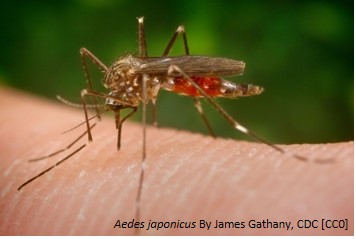Policy Concern Category: Public Health, Invasive species
Within the framework of the MEMO project (for further details, click here), exotic mosquito species (EMS) are actively monitored to understand the levels of risk that Belgium faces with regard to the invasion and establishment of these EMS and to define the control measures that need to be taken to prevent or eradicate such invasions. Different Aedes species are (on occasion) being detected in Belgium, including Aedes japonicus. A previous eradication program executed in 2014 aimed at eradicating the locally established population found in the southern region of the country (Natoye). However, the species was detected again recently at the same location indicating potential remnant individuals or/and new introduction events. Moreover, Ae. japonicus was recently collected at the border with Germany, potentially indicating natural spread from across the border. To further investigate the introduction pathways of this exotic and the success of the past eradication campaign, BopCo is collaborating with the Institute of Tropical Medicine, the Swiss Tropical and Public Health Institute and the Federal Research Institute for Animal Health, to investigate the population genetic structure of the Aedes japonicus populations, including the use of NADH dehydrogenase subunit 4 sequences, microsatellites and Single Nucleotide Polymorphisms (SNPs).
BopCo Coordinator: Nathalie Smitz
Publications & Presentations:
- Smitz, N., De Wolf, K., Deblauwe, I., Kampen, H., Schaffner, F., De Witte, J., Schneider, A., Verlé, I., Vanslembrouck, A., Dekoninck, W., Meganck, K., Gombeer, S., Vanderheyder, A., De Meyer, M., Backeljau, T., Werner, D., Müller, R., Van Bortel, W. 2021 'Population genetic structure of the Asian bush mosquito, Aedes japonicus (Diptera, Culicidae), in Belgium suggests multiple introductions'. Parasites & Vectors 14:179. https://doi.org/10.1186/s13071-021-04676-8
- Honnen, A.-C., Augusten, X., Deblauwe, I., Führer, H.-P., Ibanez-Justicia, A., Smitz, N., De Wolf, K., Van Bortel, W. & Müller, P. 2020. 'Aedes japonicus in Switzerland - where did it come from?'. 2nd AIM-COST Annual Conference, 12-13 February 2020. Lisbon, Portugal.
- De Wolf, K., Smitz, N., Deblauwe, I., Vanslembrouck, A., Meganck, K., Gombeer, S., Van Bourgonie, YR., Verlé, I., Schneider, A., De Witte, J., Dekoninck, W., Backeljau, T., De Meyer, M. & Van Bortel, W. ‘The state of the art of the exotic mosquito species in Belgium: new invasion pathways detected’. 21st European Society for Vector Ecology (E-SOVE) conference, 22-26 October 2018, Palermo, Italy.
Partners & Collaborators: Institute of Tropical Medicine (Belgium); Swiss Tropical and Public Health Institute (Switzerland); Federal Research Institute for Animal Health (Germany)
Links:
Versteirt, V., Schaffner, F., Garros, C., Dekoninck, W., Coosemans, M., & Van Bortel, W. (2009). Introduction and establishment of the exotic mosquito species Aedes japonicus japonicus (Diptera: Culicidae) in Belgium. Journal of Medical Entomology, 46(6), 1464-1467.
Le moustique japonais en Wallonie
Des moustiques tigres à nouveau repérés en Belgique
Pas de moustiques tigres observés en Belgique l’année dernière
Pictures:




Database: SNP database not yet published; microsatellite database can be found following this link: https://doi.org/10.1186/s13071-021-04676-8; online NADH4 sequences can be found here

